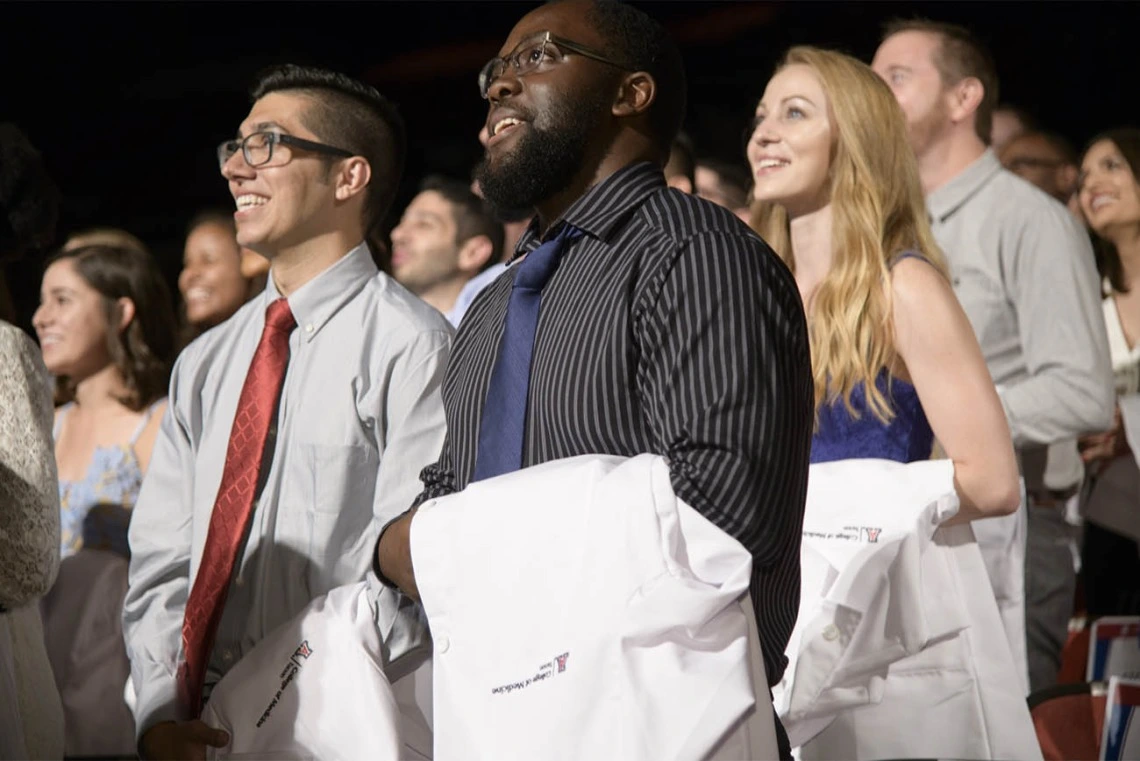White Coat Ceremony Recognizes Students who Started Medical School During the Pandemic
College of Medicine – Tucson Class of 2024 medical students will receive their white coats on Feb. 25.

What: Class of 2024 White Coat Ceremony
When: Friday, Feb. 25, 5-7 p.m.
Where: UArizona Student Union, Grand Ballroom, 1303 E. University Blvd., Tucson.
Reporters and editors: Media are invited. To arrange interviews with students, contact David Bruzzese, 520-626-9722, dbruzzese@email.arizona.edu.
TUCSON, Ariz. — After their White Coat ceremonies were postponed in 2020 and 2021 due to COVID-19, the University of Arizona College of Medicine – Tucson Class of 2024 students will receive their white coats on Feb. 25 from 5 to 7 p.m. in the Grand Ballroom at the UArizona Student Union.
The White Coat Ceremony recognizes medical students’ entry into medicine with their first physician’s white coat, the frock of their future profession.
“We were reminded how impactful these ceremonies are to students and faculty when we were forced to delay them due to the pandemic,” said Kevin Moynahan, MD, the college’s vice dean for education and a professor of medicine. “The Class of 2024 demonstrated their resilience as they began their journey as physicians online during the start of a global pandemic.”
Guest Speaker
Class of 1999 alumni Bert Vargas, MD, will speak at the event. A Tucson native, Dr. Vargas is a sports neuroscience and concussion specialist who has worked with the NFL and NASCAR as a neurotrauma consultant. He is a U.S. Air Force veteran who served with distinction as a flight surgeon during combat missions in Afghanistan and Iraq.
Class of 2024
The Class of 2024 is 55% female and 45% male, with ages ranging from 22 to 37. Eighty-nine students are from Arizona, 29 are from Tucson and 18% are first-generation college students.
Aileen Lee is a first-generation Singaporean Indonesian Chinese American from Eugene, Oregon, who graduated with honors from Georgetown University with a bachelor’s degree in international health. She spent 16 weeks in Ghana, where she investigated women’s access to reproductive health. After working as a genitourinary cancer clinical trial coordinator at Weill Cornell Medicine in New York City for three years and co-authoring multiple publications, she volunteered with AmeriCorps in Willcox, Arizona, to expand naloxone training programs and establish health prevention programs for the elderly. At the College of Medicine – Tucson, Lee was elected class president, awarded a full-tuition Primary Care Physician scholarship and spent a summer on the Navajo Nation as part of the Rural Health Professions Program.
Eli Thompson of Peoria, Arizona, was introduced to medicine when he lost his mother at the age of 10. As a physiology undergraduate in the College of Medicine – Tucson, he became involved in African Americans in Life Sciences and Native Student Outreach Access and Resiliency, advocating for, mentoring and learning from underrepresented students. Thompson studied colorectal cancer in the lab of Valentine N. Nfonsam, MD, MS, FACS, and was awarded second place for general surgery oral presentations at the Arizona Chapter of the American College of Surgeons. He has been involved in the African American Medical Student Association, the Student National Medical Association, the ASCO Oncology Summer Internship and the Medical Student Research Program.
Brenda Valencia Gonzales is a native Tucsonan and first-generation college student whose parents are from Mexico. Her mother’s search for alternative therapies for migraine headaches sparked Valencia’s interest in medicine. After working in the lab of a nephrology professor who served as her mentor in the Border Latino and American Indian Summer Exposure to Research program, she focused her UArizona Honors College senior thesis on chronic kidney disease and graduated with a bachelor’s degree in physiology. She also participated in the FACES Conversantes program for students who plan to serve bilingually in their medical careers; Global MedCats, where she shadowed doctors in Costa Rica and learned about universal health care systems; and AZ-HOPE, which connects students to mentors in the health professions. Valencia scribed for a year with El Rio Community Health and later entered the college’s Pre-Medical Admissions Pathway program for students with greater-than-average challenges. Now a second-year medical student, Valencia completed a clinical rotation at the Gila Valley Clinic in Safford, Arizona, as part of the Rural Health Professions Program.
The first University of Arizona College of Medicine – Tucson White Coat event was held in 1995 and has been a tradition for incoming UArizona medical students since.
A “Humanism in Medicine” lapel pin, provided by The Arnold P. Gold Foundation, which established the first white coat ceremony in 1993 at Columbia University in New York, will be affixed to each coat. The foundation, established in 1989 to foster humanism and compassionate care in medicine, stated: “By establishing this meaningful ritual at the beginning of medical school, students become aware of their responsibilities from the first day of training.”
For more information, including parking and seating arrangements, visit the College of Medicine – Tucson website. For those who are unable to attend in person, the event will be livestreamed on the College of Medicine – Tucson’s Facebook page.
Contact
David Bruzzese
520-626-9722
dbruzzese@email.arizona.edu

